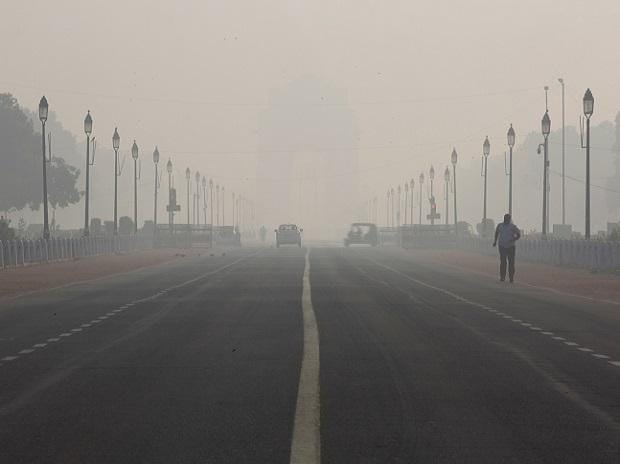-
ALSO READ
Spotlight on air quality ahead of winter and stubble-burning in the North
Delhi govt ramps up car pollution check, warns of Rs 10K fine on offenders
Cities need to become role models for action against climate change
Stalin asks Delhi, 3 other states to lift 'unreasonable' firecracker ban
Air-pollution is major cause behind rising non-communicable diseases
-
Delhi's air quality was in the 'very poor' category on Friday morning with the AQI at 386, after the nation celebrated Diwali. Earlier on Friday, the air quality at Delhi's Janpath reached the 'hazardous' category as concentrations of Pollution Meter (PM) 2.5 stood at 655.07.
The air quality index (AQI) was at 341 on Thursday morning and dropped to 382 by the evening, according to the System of Air Quality and Weather Forecasting And Research (SAFAR), the government’s pollution monitoring system.
According to SAFAR, Delhi's AQI would not improve till Sunday and will fluctuate in the 'very poor' category.
In Noida, the AQI was at 448, in the severe category, on Friday morning.
An AQI between zero and 50 is considered 'good', 51 and 100 'satisfactory', 101 and 200 'moderate', 201 and 300 'poor', 301 and 400 'very poor', and 401 and 500 'severe'.
Reuters reported earlier this week authorities have warned that Delhi’s air quality is set to drop sharply in November. Factors including falling temperatures, a drop-off in wind speed, and farmers torching crop stubble are likely to turn the air hazardous.
A delayed end to the monsoon and a sharp pick-up in wind speeds ensured that the concentration of hazardous, small airborne particles known as PM2.5 in a cubic metre of air averaged 72 in October when air quality typically takes a turn for the worse.
That was sharply down from an average concentration of 126 recorded in October 2020 - 25 times over the World Health Organization's safe limit - according to data gathered by the state-run Central Pollution Control Board.
 Dear Reader,
Dear Reader,
Business Standard has always strived hard to provide up-to-date information and commentary on developments that are of interest to you and have wider political and economic implications for the country and the world. Your encouragement and constant feedback on how to improve our offering have only made our resolve and commitment to these ideals stronger. Even during these difficult times arising out of Covid-19, we continue to remain committed to keeping you informed and updated with credible news, authoritative views and incisive commentary on topical issues of relevance.
We, however, have a request.
As we battle the economic impact of the pandemic, we need your support even more, so that we can continue to offer you more quality content. Our subscription model has seen an encouraging response from many of you, who have subscribed to our online content. More subscription to our online content can only help us achieve the goals of offering you even better and more relevant content. We believe in free, fair and credible journalism. Your support through more subscriptions can help us practise the journalism to which we are committed.
Support quality journalism and subscribe to Business Standard.
Digital Editor












RECOMMENDED FOR YOU